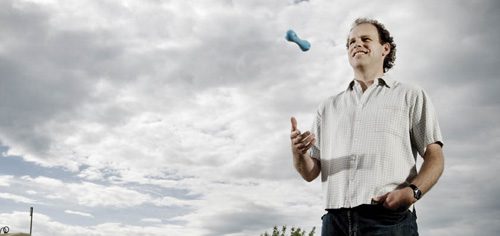
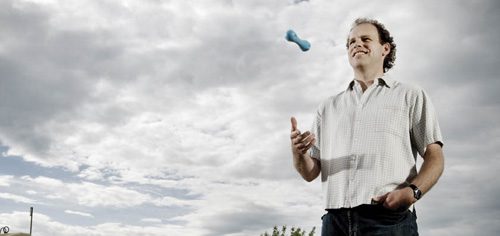
Companies with a Conscience
Actions do speak louder than words and these six entrepreneurs learned that charity actually begins at the office.
Today, it isn’t enough to simply pay lip service to social responsibility. Actions do speak louder
than words and these six entrepreneurs learned that charity actually begins at the office. See
how this special group of dog lovers is doing its part to make this world a better place to live.

Spencer Williams, West Paw Design
Connections are important for Spencer Williams. The self-described
passionate dog owner wanted to create top-quality, durable pet toys and beds.
But more than that, he wanted to create a connection between those who make
the product and those who use them.
“That connection ensures that you know our products are safe and our
employees are treated wonderfully well,” he says.
West Paw Design reflects the values Williams holds dear. He says he won’t
make short-term choices for short-term gain but, instead, takes a longer, more
sustainable view. He believes in minimizing negative environmental impacts
while fostering local and world communities.
“We provide a workplace for disabled individuals including job placement,”
he says. “They get a quality job; that person gets to leave a sheltered environment
and leave home and do real work.”
He points out that this allows his employees to connect with people they may
otherwise not have met.
Williams uses only regenerated fibres in the stuffing for his products—brand
new fibres coming from post-consumer bottles.
“It’s absolutely premium because when you take a drink bottle, its incredibly
high-grade plastic. It feels softer and more durable.”
His decisions are making a difference already. So far, he has diverted 25 tons
of plastic bottles from landfills.westpawdesign.com
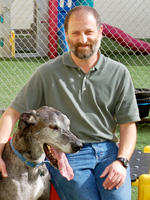
Mark Klaiman, Pet Camp
When you think about a 6,000 square-foot overnight and daycare facility
for dogs, don’t think traditional kennel. At Pet Camp in San Francisco, think next generation.
“We have outdoor play space, a swimming pool, classical music 24/7 with 20
sets of speakers,” says Mark Klaiman. “We really try and accommodate what you
would want for your own pet in your own house. We built an urban facility to cater
to urban dogs—none have a big back yard in San Francisco.”
Dogs staying at Pet Camp are separated according to size or special needs, and
play within the groups they are comfortable in. Small dogs, for instance, have their
own private floor in the facility and never have to lay their eyes on the big dogs.
Klaiman says that his facility operates in the least environmentally intrusive manner
possible. 252 solar panels, the largest privately financed solar panel system in
San Francisco, produce 33 kilowatts of power. Two 20-foot-diameter ceiling fans
keep the air circulating, moving 68,000 cubic feet of air and using less electricity
than needed to power a light bulb. All wattage was converted from 110 to 220.
“The net result is our electrical use, in terms of dollars, went from $25,000 a year
to $9,000,” says Klaiman. “We’ve cut our electrical consumption by two-thirds.”
Even doggy-doo is converted into electricity. Klaiman delivers dog waste to a local
biomass facility. His “green” workplace, which also includes quality healthcare and
profit-sharing for employees, allows him to look into the mirror and like what he
sees.
“We provide quality but also have a moral obligation to do more. It’s not just
about the money; it’s about loving what we do and being respected by the community.”
petcamp.com
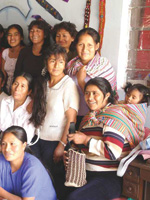
Patricia Queirolo, Alqo Wasi
When its name means "Dog Home" in the native language of the Inca,
you know this company is committed to dogs. Patricia Queirolo, its 23-yearold
owner, makes ethnic apparel for canines, buying the hand-woven textiles
(hand-made, hand-loomed, hand-embroidered, hand-knit) from women weavers
in local Peruvian communities.
Owner Patricia Queirolo believes that, living in a third-world country, she
must help those less fortunate in “becoming something more.”
“I’m in a good economic position so I can do something to help others,”
she says. “It’s not only about making money, but contributing to my country.”
Queirolo believes companies should not only create profits for themselves,
but should contribute in some way to their communities. Quality of life is
directly related to social responsibility, she states, and, in underdeveloped
countries such as hers, this goes beyond charity. Creating good jobs and
being environmentally responsible helps reduce poverty by generating sustainable
income and therefore sustainable development for her country.
In communities like Puno, located 2,700 meters above sea level, people
suffer the effects of freezing weather and more than 64 percent of townsfolk
live in poverty, a quarter of those in extreme poverty. Yet Puno has the best
weaving technique, Queirolo says, and her company can give these women
work by asking them to do embroidery or weaving.
“They can feed themselves and make their own communities better.”
alqowasi.com
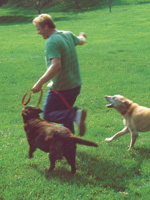
Kristen Smith, Planet Dog Foundation
The Planet Dog founders knew they could make socially responsible
dog toys—toys that would meet their goal of developing innovative
high-end products but with a nod to social responsibility like that modeled
at Ben & Jerry’s or Patagonia. They came up with Orbee-Tuff, a signature
compound that bounces, floats, provides safe chewing fun, comes in a
variety of toy shapes, and, best of all, is recyclable.
Celebrating their tenth anniversary in business this year, Planet Dog
makes toys, leashes, collars, and travel gear for discerning dog owners.
Even better than a decade in business is the founders’ commitment to
their community. They created the Planet Dog Foundation, to whom they
donate an ever-increasing percentage of their sales.
“The Foundation is a grant-making organization,” says Foundation
Director Kristen Smith. “We give cash grants to small non-profits that
train and provide dogs to people in need: service dogs, guide dogs, therapy
dogs, canine search and rescue, police and fire dogs.”
Smith said dogs have an amazing capacity to help people in need.
Beyond that, she says, studies have shown that companies having social
giving programs have increased employee morale.
“I am proud to work for a company that places a high priority on giving
back to the community,” she says. “Dog lovers appreciate what dogs
can do to help people.” planetdog.com
Join the newsletter and never miss out on dog content again!
"*" indicates required fields
By clicking the arrow, you agree to our web Terms of Use and Privacy & Cookie Policy. Easy unsubscribe links are provided in every email.